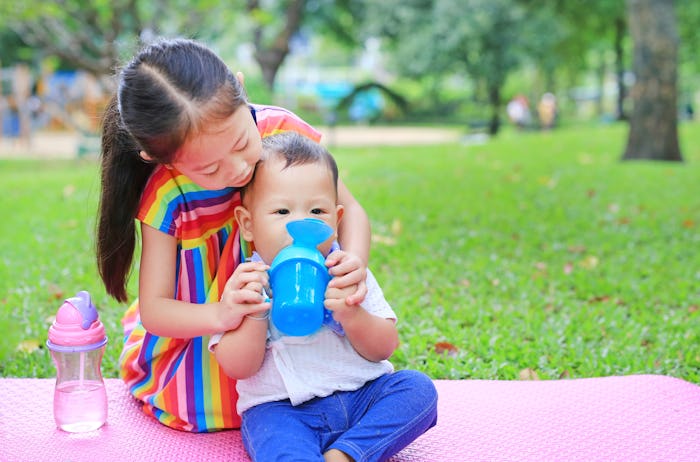Life

Before You Give Your Baby Juice, Here's What Pediatricians Want You To Know
One of the best things after your baby hits 6 months is introducing them to food. It’s so much fun to see them experience different flavors and textures for the first time — especially when you can share your favorites. Some parents wonder when babies can have juice, because that almost seems like a kid rite of passage. I remember drinking a lot of apple and orange juice as a kid (OK, since I’m an ‘80s/’90s kid it was Sunny Delight, which isn’t really orange juice), but pediatricians now definitely have a different viewpoint when it comes to juice, no matter how old your child is. And I’m afraid Sunny Delight will not be recommended as a refrigerator staple.
Dr. Gina Posner, a board-certified pediatrician at MemorialCare Orange Coast Medical Center in Fountain Valley, California, tells Romper, if you have to give your baby juice, it’s best to wait until they’re at least a year old. However, “I don’t think there is ever a need for juice — ever. Think of juice as vitamin-fortified soda. I definitely recommend watering it down with mostly water as long as you can get away with it, because it’s healthier for your child in the long run.”
Additionally, Dr. Robert Hamilton, a pediatrician at Providence Saint John’s Health Center in Santa Monica, California, and author of 7 Secrets of the Newborn, says there is no “definitive answer” to when juice is appropriate other than that pediatricians recommend only breast milk or formula for the first 6 months. But he does tell Romper, “After this age, most U.S. pediatricians recommend slowly introducing solid (pureed) foods into the child’s diet. When one begins the fruit, it’s OK to also begin the juice of that fruit, but parents should understand that juice only — without the benefit of the fruit pulp — is a high-sugar, high-calorie meal.”
Hamilton agrees with Posner and says there is no redeeming value in fruit juices as it relates to the nutritional value, “Except when there is an issue of infrequent and hard bowel movements during the first year of life.” He recommends the ratio of 1:1 diluted prune or pear juice in small quantities (2 to 4 ounces) to alleviate constipation. Or, just eating the fruit to give your child plenty of fiber to help constipation — without the additional calories and sugar, says Posner.
Obviously, you should talk to your own pediatrician before making any dietary changes for your child, and you should make your best judgement when it comes to letting your kid have juice or not. According to these two pediatricians (and I’m sure many others), it’s probably best to keep your kids away from bottled store-bought juice as long as possible, but if you do want them to experience the childhood classic that is apple juice, at least wait until they’re a year old and maybe dilute it with water. If they’re constipated before a year old, it’s safe to give them 2 to 4 ounces of prune juice with a 1:1 ratio of juice to water. Once they’re old enough for solids, giving them a piece of whole fruit will be enough fiber to do the trick.
Experts:
Dr. Robert Hamilton, pediatrician at Providence Saint John’s Health Center
Dr. Gina Posner, board-certified pediatrician at MemorialCare Orange Coast Medical Center
This article was originally published on